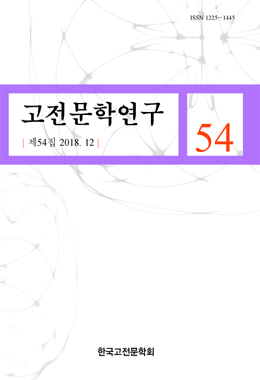이 논문은 劍銘·諷刺寓言·游俠敍事의 세 가지 양식에 주목하여 한문학에 담겨진 정의의 문제를 살펴본 것이다. 사대부 문인에게 ‘義’는 매우 중시된 가치로 天理의 구현을 가로막는 私慾을 끊는 실천 윤리로 작용하였다. 대다수의 검명에서 검은 사대부의 심성 수양에서 결단의 용기를 상징하는 忠義의 표상으로 등장한다. 풍자우언은 유가의 正名論에 맞서서 도가의 無名論을 구현하려는 언어관을 반영한다. 도가의 무명론에 입각해 名과 實의 불일치를 강조하며 현실 세계의 모순을 비판하는 양식이 풍자우언이다. 풍자우언은 시비가 전도되어 부정이 횡행하는 현실을 풍자함으로써 참된 정의의 문제를 성찰하게 하거나, 시대의 모순과 부조리를 정면으로 고발기도 한다. 유협서사는 조선 후기에 성장한 여항과 평민층의 의식을 반영하여 성립된 양식으로 朋友有信의 수평적 윤리가 주목받는 시대적 흐름을 반영한다. 유학적 이념에 따른 忠義보다는 신의와 우정을 중시하는 유협서사는 중세 예교의 속박에서 벗어난 자유정신이나, 다른 사람의 위급한 처지를 도와주는 義氣를 중시한다. 유협서사는 사대부가 아닌 여항과 평민층의 정의관을 반영한 것으로 주목된다.
이 글은 검명·풍자우언·유협서사에 국한하여 일부 작품만을 대상으로 논의를 전개하였기에 한문학에 담긴 ‘정의’의 양상을 해명하기에는 한계를 지닐 수밖에 없다. 향후 다양한 작품을 대상으로 정치한 논의가 이어지길 기대한다.
This paper focuses on the three forms of theories: Signature on sword(劍銘), Fable of satire(諷刺寓言), Narrative of chivalry(游俠敍事) and looks at the aspect of “justice” in Korean Classical Chinese literature. To the literary people, loyalty(義) served as a practice ethic that would stop the desire of human nature(私慾) from the laws of nature(天理) with a very important value. Most of the signature on swords(劍銘) are represented by the symbol of determination in the mind-building of loyalty(忠義). A Fable of satire(諷刺寓言) reflects the language of the Taoist(道家) in the face of the Confucian scholar(儒家). A satirical speech criticizes the contradictions of the real world, while emphasizing the inconsistencies between appearance(名) and essence(實) based on the Nonnationalism(無名論) of Taoist(道家). A satirical speech is often used to reflect upon the problems of true justice by satirizing the reality of corruption, or to report the contradictions and absurdities of the times. Narrative of chivalry(游俠敍事) was established in a way that reflects the consciousness of the common people who grew up in the late Joseon Dynasty, reflecting the trend of the era in which horizontal ethics of faith of friends(朋友有信). Narrative of chivalry(游俠敍事) which values righteousness and friendship over loyalty(忠義) of Confucian ideology, places importance of conscience(義氣) based on freedom from the pressure of medieval and helping others to be in a critical situation. It is noteworthy that the Narrative of chivalry reflects the view of the the common people, not the high classes of society. Since this article has been discussed only in some of literary works: Signature on sword(劍銘), Fable of satire(諷刺寓言), Narrative of chivalry(游俠敍事), it is inevitable to explain the aspects of "justice" in Korean literature. We sincerely hope that political discussions will continue on various literatures in the future.




